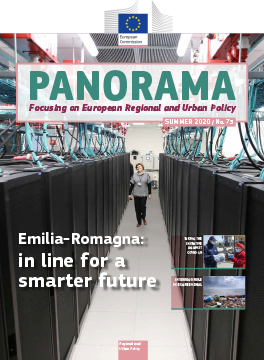Over the last few months, the coronavirus pandemic has changed numerous aspects of people’s everyday lives. Across the EU, restrictions have been imposed on many internal borders for health security reasons. Nowhere is this more evident than along the border between Italy and Slovenia. After the Second World War, the territory around the city of Gorizia was split between Italy and Yugoslavia (now the Republic of Slovenia) with the old town remaining in Italy and the new town of Nova Goric
Italy and Slovenia cooperate to combat COVID-19 crisis
- 02 September 2020

Over the last few months, the coronavirus pandemic has changed numerous aspects of people’s everyday lives. Across the EU, restrictions have been imposed on many internal borders for health security reasons.
Nowhere is this more evident than along the border between Italy and Slovenia. After the Second World War, the territory around the city of Gorizia was split between Italy and Yugoslavia (now the Republic of Slovenia) with the old town remaining in Italy and the new town of Nova Gorica developing on the other side of the frontier.
These two cities, separated by a ‘soft’ iron curtain (Yugoslavia was a socialist country although not part of the Warsaw Pact) for 57 years, joined by the adjacent municipality of Šempeter-Vrtojba, prepared a joint strategy to develop their single urban area. Due to a lack of suitable legal tools to provide a common cross-border strategy and the need to pave the way for joint infrastructures and services, in 2011, Gorizia, Nova Gorica and Šempeter-Vrtojba set up the EGTC-GO (European Grouping of Territorial Cooperation).
The aim was to plan a single cross-border city and foster the idea that cooperation could provide a real development opportunity. Thanks to policymakers and skilled practitioners, the EGTC GO became an intermediate body and single beneficiary of the first and currently only Integrated Territorial Investment (ITI) supported by Interreg.
On 29 February 2020, the mayors of Gorizia (Italy) and Nova Gorica (Slovenia) – Rodolfo Ziberna and Klemen Miklavič – celebrated together in the Slovenian capital Ljubljana, supporting the transition to the second phase of Nova Gorica and Gorizia’s candidacy for the European Capital of Culture 2025 (ECOC 2025).
Breaking down barriers
Previously, with a hastily built fence, the Slovenian city of Nova Gorica had cut itself off from its Italian twin in a gesture which initially seemed to symbolise a return to a bitter and divisive past. Now, in the middle of the coronavirus emergency, the two mayors face each other daily, but at a distance.
The GO!2025 team brought them together during the inauguration of the ‘Virtual Cafe with GO! 2025 Nova Gorica - Gorizia’, one of the initiatives for the ECOC 2025 candidacy, coordinated by the EGTC GO, via live streaming on the Facebook Page GO! 2025 Nova Gorica-Gorizia. Although border controls have been temporarily restored, causing suffering and sadness, the two cities have continued to work closely together with a view to jointly confronting the common emergency.
‘The number of infected in Nova Gorica is low compared to the rest of Slovenia, said Mayor Miklavič, and Nova Gorica has been able to move faster thanks to the almost daily updates on the Italian situation given by my friend and colleague Ziberna. The life of the two cities is deeply intertwined and this emergency situation has made us understand that it is necessary to identify a common management system to deal with such an emergency.’
Ziberna stressed that, thanks to the EGTC GO’s role, the European Grouping of Territorial Cooperation established by Gorizia, Nova Gorica and the neighbouring Šempeter-Vrtojba, the cross-border territory can send Europe a strong signal. ‘The EGTC GO is Europe,’ stressed Ziberna. We represent the promotion of a Europe of possibilities, a model of collaboration to be exported to other countries.’ The two mayors agreed to consider EGTC GO as a key player in accelerating the economic recovery and cross-border development process once the emergency ends.
Uniting cities and citizens
During the pandemic, cross-border teams of doctors and patients have continued to work remotely, events are being organised via Facebook, including Slovenian and Italian language courses which have attracted hundreds of people. The city mayors have been in constant contact, urging their respective national governments to reopen the border as soon as possible, and coordinating mutual support in emergency-related issues. Locals play badminton and volleyball over the newly constructed fence, celebrate birthdays, and separated couples meet.
EGTC GO is very aware that the pandemic could quickly undo the progress made recently and are convinced that cooperation is more than ever rooted in the hearts and minds of most people living on both sides of the border who feel they belong to a unique and unified city.
The ECOC 2025 candidacy must be seen as a development opportunity for these cross-border territories, not only in the cultural sector. ‘Our cross-border region has got a very important and impactful tool – the EGTC – which should now concentrate on the economic problems of our territory. It must be able to channel EU funds for economic and development projects to accelerate the economic recovery,’ Miklavič concluded.
Videos (produced for the European Capital of Culture 2025):
Short: https://youtu.be/ZfsOrRuGvhE
